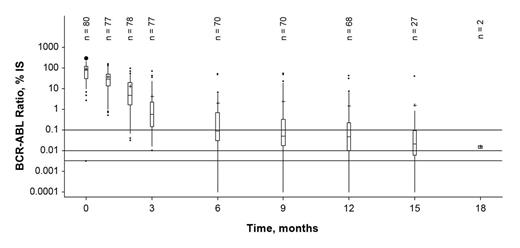Abstract
Frontline nilotinib 300 mg twice daily (BID) provides superior efficacy vs imatinib in pts with CML-CP, with good tolerability. Evaluating Nilotinib Efficacy and Safety in Clinical Trials—Extending Molecular Reponses (ENESTxtnd) is evaluating the kinetics of molecular response to frontline nilotinib 300 mg BID in pts with newly diagnosed CML-CP, as assessed in national and local laboratories, and is also the first study to evaluate the safety and efficacy of nilotinib dose optimization (including dose re-escalation in pts who require dose reductions due to adverse events [AEs] and dose increase in pts with less than optimal response). Here, we present results of a preplanned, interim analysis (IA) based on the first 20% of pts who completed 12 mo of treatment or discontinued early.
ENESTxtnd (NCT01254188) is an open-label, multicenter, phase 3b clinical trial of nilotinib 300 mg BID in adults with CML-CP newly diagnosed within 6 mo of study entry. The primary endpoint is rate of MMR by 12 mo. Molecular responses were monitored by real-time quantitative polymerase chain reaction (RQ-PCR) at local laboratories at baseline, at 1, 2, and 3 mo, and every 3 mo thereafter. Bone marrow cytogenetic analyses were performed locally at baseline, 6 mo, and end of study. Dose reductions were allowed for grade ≥ 2 nonhematologic AEs and grade 3/4 hematologic AEs. Pts with dose reductions could attempt to re-escalate (successful re-escalation defined as ≥ 4 wk on nilotinib 300 mg BID with no dose adjustments for any AE) and remain on study. Dose increase to nilotinib 400 mg BID was allowed in cases of BCR-ABL > 10% on the International Scale (BCR-ABLIS) at 3 mo or later, no major molecular response (MMR; BCR-ABLIS ≤ 0.1%) at 12 mo, loss of MMR, or treatment failure.
This IA includes 85 pts treated in 12 countries (Argentina, Australia, Brazil, Canada, Israel, Lebanon, Mexico, Malaysia, Saudi Arabia, Thailand, Taiwan, and South Africa). Median age was 49 y (range, 19-85 y), and 58% of pts were male. Median time since diagnosis was 35 days (range, 2-157 days). Prior to study entry, 64 pts (75%) received hydroxyurea, and 3 pts (4%) received imatinib (all for ≤ 2 wk).
At the data cutoff, 68 pts (80%) had treatment ongoing, and the remaining 17 had discontinued due to AEs/laboratory abnormalities (n = 8; nonhematologic AEs [n = 5], biochemical abnormalities [n = 2], and hematologic abnormalities [n = 1]), loss to follow-up (n = 2), administrative problems (n = 2), intolerance to the protocol-proposed dose (n = 2), suboptimal response (n = 1), withdrawal of consent (n = 1), or protocol deviation (n = 1). Median time on treatment was 13.8 mo (range, 1 day-18 mo). Median actual dose intensity of nilotinib was 597 mg/day (range, 165-756 mg/day), and 85% of pts had an actual dose intensity of > 400 mg/day to ≤ 600 mg/day. Of 30 pts with dose reductions due to AEs, 19 (63%) successfully re-escalated to nilotinib 300 mg BID. Nine pts (11%) dose escalated to nilotinib 400 mg BID due to lack of efficacy.
The primary endpoint of MMR by 12 mo was achieved by 57 pts (67%; 99.89% CI, 49%-82%). Complete cytogenetic response by 6 mo was achieved by 48 pts (56%). Median BCR-ABLIS decreased over time, with a median value of 0.05% (range, 0.00%-41.36%) at 12 mo (Figure). Most pts (91%) achieved early molecular response (BCR-ABLIS ≤ 10% at 3 mo). Of the 8 pts (9%) with BCR-ABLIS > 10% at 3 mo (4 of whom were then dose escalated), 3 achieved MMR by 12 mo (1 of whom had been dose escalated). By the data cutoff, no pt had progressed to accelerated phase/blast crisis (AP/BC), and there had been no deaths on study.
Nilotinib was well tolerated, with a safety profile similar to that seen in other frontline studies. Drug-related nonhematologic AEs (≥ 10% of pts) were rash (31%), constipation (13%), and headache (13%). Newly occurring or worsening grade 3/4 hematologic or biochemical abnormalities (≥ 10% of pts) were neutropenia (17%), thrombocytopenia (17%), increased lipase (13%), and increased bilirubin (12%).
These results demonstrate that dose-optimized nilotinib affords high rates of molecular response in pts with newly diagnosed CML-CP. Further, they support the feasibility of nilotinib dose re-escalation in pts who require temporary dose reductions due to AEs, with 63% of dose-reduced pts able to successfully re-escalate to nilotinib 300 mg BID and safely continue therapy.
Lipton:Novartis: Honoraria, Membership on an entity’s Board of Directors or advisory committees, Research Funding, Speakers Bureau; Bristol Myers Squibb: Honoraria, Membership on an entity’s Board of Directors or advisory committees, Research Funding, Speakers Bureau; Ariad: Equity Ownership, Honoraria, Membership on an entity’s Board of Directors or advisory committees, Research Funding, Speakers Bureau; Pfizer: Honoraria, Membership on an entity’s Board of Directors or advisory committees, Research Funding, Speakers Bureau. Meillon:Bayer: Honoraria; Novartis: Honoraria; Bristol Myers Squibb: Honoraria; Pfizer: Honoraria. Louw:Novartis: Congress attendance support Other, Consultancy, Honoraria, Membership on an entity’s Board of Directors or advisory committees, Research Funding, Speakers Bureau; Bristol Myers Squibb: Congress attendance support, Congress attendance support Other, Consultancy, Honoraria, Membership on an entity’s Board of Directors or advisory committees, Research Funding; Pfizer: Research Funding. Pavlovsky:Novartis: Research Funding, Speakers Bureau; Bristol Myers Squibb: Speakers Bureau. Jin:Novartis: Employment. Acharya:Novartis Healthcare Pvt. Ltd.: Employment. Woodman:Novartis: Employment, Equity Ownership. Hughes:Novartis: Consultancy, Honoraria, Research Funding; Bristol Myers Squibb: Consultancy, Honoraria, Research Funding; Ariad: Consultancy, Honoraria; CSL: Research Funding. Turkina:Novartis: Consultancy, Honoraria; Bristol Myers Squibb: Consultancy, Honoraria.
Author notes
Asterisk with author names denotes non-ASH members.


This feature is available to Subscribers Only
Sign In or Create an Account Close Modal